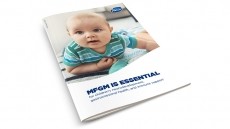Nutrition group backs breastfeeding advice in 1000 days government report

Launched last month, the report forms part of the UK government’s plan to improve health and development outcomes for babies in England, with an emphasis placed on nutrition during the two years of life.
The report is keen to encourage mothers to breastfeed as a first choice after cited figures reveals that 48% of mothers breastfeed their baby at 6-8 weeks in England compared to Norway (89-91%), Sweden (84%), Italy (84%), Germany (73%) and Spain (72%).
“BSNA members recognise breastfeeding is the best way to feed an infant and is important for both mother and baby’s health and well-being,” the Association says.
“When a mother cannot, or chooses not to breastfeed, bottle feeding with a scientifically developed formula milk is the only suitable and safe alternative to breastmilk.
“BSNA strongly welcomes the recognition within the report that parents should be respected and supported in their decision on how to feed their baby and that infant feeding support should include advice and support for all forms of feeding.”
Universal vision
Along with a review of midwifery and health visiting services, the report details how breastfeeding could be encouraged during this period, tying into the government’s vision of feeding support as part of the Universal offer to all parents and carers.
The report, chaired by Member of Parliament (MP) Andrea Leadsom, is quick to hail the benefits of breastfeeding, highlighting research that points to breast milk possibly reducing the risk of childhood obesity by up to 25%.
Further health benefits include breast milk’s possible role in lowering risk of Sudden Infant Death Syndrome by 45-73% as well as lowering the risk of breast cancer by 4.3%.
The BSNA says, “receiving the right nutrition at the very start of life, and the subsequent early years, is a key factor in supporting positive outcomes.
“Recent BSNA research with mothers, midwives and health visitors identified clear gaps and unaddressed information needs that have both practical and emotional consequences for parents.
“20% of healthcare professionals surveyed feel mothers are not receiving sufficient advice and support to ensure they are able to make informed decisions on how to feed their infant and over half of mothers in the survey would like more information on formula feeding.”
Alonside breastfeeding, the use of formula is acknowledged in the report as important in contribuitng to the health of a developing infant. It stresses the support offered here to mothers unable to breastfeed or simply choose not to.
“Our vision is that infant feeding support is always available as part of the Universal offer to all parents and carers, including help for breastfeeding, advice and early diagnosis of issues such as tongue-tie, and help with formula feeding where that is more appropriate.
“The Review heard a lot from parents about the positive impact breastfeeding can have on confidence and self-esteem, so breastfeeding support groups and peer networks should be an important part of the Universal offer.”
BSNA report
In February of this year, the BSNA’s own report on this subject expressed concern that many parents were not receiving sufficient information and advice to ensure they are able to make informed choices on how they feed their infants.
Survey findings revealed a strong appreciation from mothers for the support and advice given to them by both midwives and health visitors.
However, a sizable majority felt the focus on breastfeeding, coupled with a lack of support for parents wishing to try combination feeding, was leading to both practical and emotional consequences.
The focus on supporting breastfeeding was being interpreted as not allowing discussion of other options, with some midwives feeling restricted by their hospital or trust in providing information on formula feeding.














